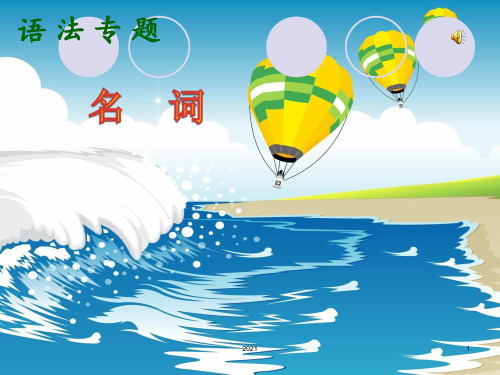英语名词 ppt课件
合集下载
小学英语语法名词专题PPT课件

(1)如果是以-s或-es结尾,它的所有格是在名词后加 “’” 。
如:the twins’ bedroom
the students’ books
(2)如果名词的复数形式不是以-s或-es结尾,它的所有格 是直接加’s。
如:a children’s book(儿童读物)
the men’s shoes
2021
2021
15
不规则变化
man--men
child--children
woman--women
goose--geese
foot --feet 2021
mouse -- mice 16
可数名词的单数变复数(不规则变化)
1.单复数同形的名词:
中国人,
日本人都非常喜欢绵羊,鱼和鹿.
Chinese Japanese people
42
2021
38
名词所有格练习
Translate these phase below.
中国的地图
美国的首都
桌子的四条腿
教室的两扇窗户 老师们的办公室 男人们的衣服
Linda的课本 Peter和Bill的爸爸 奶奶的眼镜
Lucy’s mother and Lily’s mother
teachers of our school
常用词有: a piece of 一张/ 块/ 则 a bottle of 一瓶 a cup of 一杯 a glass of 一玻璃杯
2021
5
填空 找规律
Ps:数词>1,量词用复数,of后用原形 _a_ p__ie_c_eo_f_ paper(一张纸) _a_ d__ro_p__ o_f_ water(一滴水) _t_w_o_c_u_p_s_ o_f_ tea (两杯茶) t_h_r_e_e p_i_e_c_e_s _o_f bread (三片面包)
如:the twins’ bedroom
the students’ books
(2)如果名词的复数形式不是以-s或-es结尾,它的所有格 是直接加’s。
如:a children’s book(儿童读物)
the men’s shoes
2021
2021
15
不规则变化
man--men
child--children
woman--women
goose--geese
foot --feet 2021
mouse -- mice 16
可数名词的单数变复数(不规则变化)
1.单复数同形的名词:
中国人,
日本人都非常喜欢绵羊,鱼和鹿.
Chinese Japanese people
42
2021
38
名词所有格练习
Translate these phase below.
中国的地图
美国的首都
桌子的四条腿
教室的两扇窗户 老师们的办公室 男人们的衣服
Linda的课本 Peter和Bill的爸爸 奶奶的眼镜
Lucy’s mother and Lily’s mother
teachers of our school
常用词有: a piece of 一张/ 块/ 则 a bottle of 一瓶 a cup of 一杯 a glass of 一玻璃杯
2021
5
填空 找规律
Ps:数词>1,量词用复数,of后用原形 _a_ p__ie_c_eo_f_ paper(一张纸) _a_ d__ro_p__ o_f_ water(一滴水) _t_w_o_c_u_p_s_ o_f_ tea (两杯茶) t_h_r_e_e p_i_e_c_e_s _o_f bread (三片面包)
ppt课件-英语名词名词部分讲解

01
Classification of English Nouns
Proper terminology
Proper nouns: names of specific individuals, places, or things, such as "John" or "Paris".
Proper nouns are always capitalized.
Be an attributive
Summary
"Be an" is used in English to introduce a noun that is being described or defined.
Detail
The structure "be an" is often used to introduce a noun that is being defined or described in more detail. It is often followed by an adjective or other descriptive elements that provide additional information about the noun. For example, "She is an excellent teacher" (adjective following "an").
用法
在句子中作为主语、宾语或表语使用 ,如“The cats are playing in the yard.”中的“cats”就是复数形式。
Special plural form
定义
英语语法基础-PPT

It is too difficult a test for us beginners.
He didn’t kown how great a mistake he had made. C)quite,rather与单数名词连用,冠词位于其后,但若 rather,quite前有形容词修饰,则不定冠词置于前后均可,如:
It was rather a disaster. He is rather an unplearant person.=He is a rather unpleasant person.
❖ 2,定冠词的位置
❖ 通常位于名词或名词修饰语之前,但若遇上 all,both,double,half,twice,three times等词的时候,定冠词置于其中。如:
consider one’s feelings make friends with 与某人交朋友 take measures to do sth 采取措施做某事 make repairs 修理 make matters better使情况好转
第二章冠词
❖ 分类:不定冠词,定冠词,零冠词 ❖ 冠词的位置: ❖ 1、不定冠词的位置A)若遇上such,what,many,half等词,不
❖ If I were her ,I would leave. ❖ 注:单独使用的人称代词通常用宾格。如:
❖ “I want to leave.” “Me too.”
❖ “Who did this?” “Me.” ❖ B)人称代词的排列顺序。对于单数人称代词,其排列通常为“二、三、一”
即you,he and me.而对于复数人称代词,则其排列通常为“一、二、三” 即we,you and they.如:
❖ i)用于某些习语
He didn’t kown how great a mistake he had made. C)quite,rather与单数名词连用,冠词位于其后,但若 rather,quite前有形容词修饰,则不定冠词置于前后均可,如:
It was rather a disaster. He is rather an unplearant person.=He is a rather unpleasant person.
❖ 2,定冠词的位置
❖ 通常位于名词或名词修饰语之前,但若遇上 all,both,double,half,twice,three times等词的时候,定冠词置于其中。如:
consider one’s feelings make friends with 与某人交朋友 take measures to do sth 采取措施做某事 make repairs 修理 make matters better使情况好转
第二章冠词
❖ 分类:不定冠词,定冠词,零冠词 ❖ 冠词的位置: ❖ 1、不定冠词的位置A)若遇上such,what,many,half等词,不
❖ If I were her ,I would leave. ❖ 注:单独使用的人称代词通常用宾格。如:
❖ “I want to leave.” “Me too.”
❖ “Who did this?” “Me.” ❖ B)人称代词的排列顺序。对于单数人称代词,其排列通常为“二、三、一”
即you,he and me.而对于复数人称代词,则其排列通常为“一、二、三” 即we,you and they.如:
❖ i)用于某些习语
《英语学习名词》PPT课件

5)以”辅音字母+o”结尾的名词,加-es heroes tomatoes potatoes Negroes zeroes Heroes and Negroes eat tomatoes and potatoes. 大多数以o结尾的外来词,缩略词直接加-s. radios photos pianos 6)以“oo”结尾的名词后加 -s. zoos bamboos 7)以f和fe结尾的名词的复数有三种情况: a)直接加-s. 一个首领(chief) 在海湾(gulf)的悬崖(cliff)上 发现一个屋顶(roof)上面有个保险箱(safe)。
★名词做定语 表材料、地点、用途、性质、泛指时间、整体等普 通名词可以作定语,一般用单数形式。 e.g. stone figures(石像);paper money(纸币); country music(乡村音乐);table cloth(桌布); river bank(河岸);school gate(校门口); book stores(书店);traffic lights(交通灯); summer holidays(暑假);evening dress(晚礼 服)。 但在个别情况下,也有需用复数的。 e.g. sports meet(运动会);the United States government(美国政府);students readingroom(学生阅览室);goods train(货车); two men doctors(两个男医生)。
具体化(个体名词,可数名词)
a surprise一件令人惊讶的事
a success 一个(件)成功的人(事) __________ an honor 一个(件)引以为荣的(事) ________
a failure失败者
英语单词名词学习(共10张PPT)

❖ miller铣床
❖ grinder磨床 ❖ welder电焊机 ❖ staker=reviting machine铆合机 ❖ position职务 ❖ factory director厂长 ❖ department director部长
第5页,共10页。
机构设计及生产专业单词
b机ri构de设❖❖计及da生es产spiu专stt业ya单mn词tamnaag新nea娘rg|e=rv助ic理e manager副理
bpeerpsuo❖tninneslstroecrsarogauert入cceh库d刮epa伤rtment 人力资源部
pWpllaaannteen❖❖rripn|rgpoldeoefeifni(pnd|刨a防iurst床m水hceea)ndtt企iop划nro部aduncdt成tra品ining教育与训练
面膜: facial Long lasting(持久性)
carbo❖nization碳化
mask/masque
c机a构rbo设❖n计iza及tAio生nf碳产te化专r业单s词un(日晒后用品)
Alcohol-free(无酒精) After sun(日晒后用品)
按劳分❖配
distribution according to one's performance
fuse together 熔合 After sun(日晒后用品)
按劳分❖配
distribution according to one's performance
面膜: facial mask/masque
纸箱 carton L机o构ng设❖la计st及ing生(产持专久业性单)词
叉车 left fork o机x构ida设❖tio计n及|氧生化产专业单词
❖ grinder磨床 ❖ welder电焊机 ❖ staker=reviting machine铆合机 ❖ position职务 ❖ factory director厂长 ❖ department director部长
第5页,共10页。
机构设计及生产专业单词
b机ri构de设❖❖计及da生es产spiu专stt业ya单mn词tamnaag新nea娘rg|e=rv助ic理e manager副理
bpeerpsuo❖tninneslstroecrsarogauert入cceh库d刮epa伤rtment 人力资源部
pWpllaaannteen❖❖rripn|rgpoldeoefeifni(pnd|刨a防iurst床m水hceea)ndtt企iop划nro部aduncdt成tra品ining教育与训练
面膜: facial Long lasting(持久性)
carbo❖nization碳化
mask/masque
c机a构rbo设❖n计iza及tAio生nf碳产te化专r业单s词un(日晒后用品)
Alcohol-free(无酒精) After sun(日晒后用品)
按劳分❖配
distribution according to one's performance
fuse together 熔合 After sun(日晒后用品)
按劳分❖配
distribution according to one's performance
面膜: facial mask/masque
纸箱 carton L机o构ng设❖la计st及ing生(产持专久业性单)词
叉车 left fork o机x构ida设❖tio计n及|氧生化产专业单词
ppt课件-英语名词名词部分讲解

work ❖ 8.The word “houses” underlined part is pronounced ____ . ❖ A.[siz] B.[ziz] C.[zis] D.[is] ❖ 9.Uncle Wang bought two ____ yesterday. ❖ A.watchs B.watches C.watch D.watchss ❖ 10.There are a lot of ____ down there but hardly any ____ . ❖ A.sheeps; people B.sheep; people C.sheeps; peoples
of, plenty of 等来修饰不可数名词。
❖ much money, some milk ❖ ⑤数词+名词+形容词构成的复合形容词,中间的名词不能用复数形式
而须用单数形式。 ❖ He is a four-year-old boy. 他是个4岁的男孩。(four-year-old 不能说
成 four-years-old) ❖ a five-foot-deep-hole 一个五英尺深的洞
❖ the friend of his is very kind 他的朋友非 常友好
专题训练
1.Mr Gao is a teacher. He works in a new ____. A.shop B.school C.factory D.hospital 2.If you want to know the meaning of a word, you can look it up in a ____ . A.diary B.dictionary C.newspaper D.diagram 3.Mr Shute is a friend of ____ .
of, plenty of 等来修饰不可数名词。
❖ much money, some milk ❖ ⑤数词+名词+形容词构成的复合形容词,中间的名词不能用复数形式
而须用单数形式。 ❖ He is a four-year-old boy. 他是个4岁的男孩。(four-year-old 不能说
成 four-years-old) ❖ a five-foot-deep-hole 一个五英尺深的洞
❖ the friend of his is very kind 他的朋友非 常友好
专题训练
1.Mr Gao is a teacher. He works in a new ____. A.shop B.school C.factory D.hospital 2.If you want to know the meaning of a word, you can look it up in a ____ . A.diary B.dictionary C.newspaper D.diagram 3.Mr Shute is a friend of ____ .
初中英语专题课件 名词(共18张PPT)

1.以不可数名词结尾的复合名词无复数形式:homework, newspaper 2.以man或woman为前缀的名词变复数时,前后两个名词都变成复数:woman doctor→women doctors等。 3. 以两个名词构成的复合名词(前面的名词为man或woman除外),一般把后面的名词 变复数: 如:boy friend→boy friends, paper bag→paper bags等。
专题学习(二)
名词
名词
名词是词性的一种,是表示人或事物实体存在的词,也就是实词 名词一般分为专有名词和普通名词。
实词,有实在意义,在句子中能独立承担句子成分,而且还有一个重要的特点,那就 是,实词有词形的变化,尤其是动词,可谓变化多端。 虚词:没有多少实在意义,在句子中不能独立承担句子成分,而且还有一个重要的 特点,那就是,虚词没有词形的变化。
Germans
不可数名词
不可数名词,没有复数形式,前面不能用不定冠词、数词或many等词语修饰, 但可以用some,a little,much等词语来修饰。 表达不可数名词的确切数量方式 若要表示它的个体意义时,一般要与一个名词短语连用,相当于中文里的 【数词+(量词)+ 名词】 e.g.a glass of tea一杯茶 two bags of solt 两袋盐 注意: 当数量≥2时,量词用pl.
有生命:potato→potatoes
5.以f 或fe 结尾的名词,要将f或fe改为v再加-es。如: leaf → leaves knife → knives
可数名词的不规则变化
同形 其他 不变 sheep—sheepild—children
复合名词的复数形式
专有名词
专有名词是个别的人、事物、地点、团体、机构等专有的名称,首字母通常 大写。 e.g.Canada,China,Beijing.节日、月份、星期。 注意: 英语中根据专有名词前是否带冠词可分为两类: ①零冠词,如Beijing Railway Station,是由专有名词+普通名词组成,往往为 并列关系。 ②定冠词,如the United States,the Great Wall,由形容词+普通名词组成。 一般来讲,专有名词前面不用定冠词the,但江河海洋,山脉群岛地理名称前 要用定冠词;e.g. the West lake、the Pacific Ocean
专题学习(二)
名词
名词
名词是词性的一种,是表示人或事物实体存在的词,也就是实词 名词一般分为专有名词和普通名词。
实词,有实在意义,在句子中能独立承担句子成分,而且还有一个重要的特点,那就 是,实词有词形的变化,尤其是动词,可谓变化多端。 虚词:没有多少实在意义,在句子中不能独立承担句子成分,而且还有一个重要的 特点,那就是,虚词没有词形的变化。
Germans
不可数名词
不可数名词,没有复数形式,前面不能用不定冠词、数词或many等词语修饰, 但可以用some,a little,much等词语来修饰。 表达不可数名词的确切数量方式 若要表示它的个体意义时,一般要与一个名词短语连用,相当于中文里的 【数词+(量词)+ 名词】 e.g.a glass of tea一杯茶 two bags of solt 两袋盐 注意: 当数量≥2时,量词用pl.
有生命:potato→potatoes
5.以f 或fe 结尾的名词,要将f或fe改为v再加-es。如: leaf → leaves knife → knives
可数名词的不规则变化
同形 其他 不变 sheep—sheepild—children
复合名词的复数形式
专有名词
专有名词是个别的人、事物、地点、团体、机构等专有的名称,首字母通常 大写。 e.g.Canada,China,Beijing.节日、月份、星期。 注意: 英语中根据专有名词前是否带冠词可分为两类: ①零冠词,如Beijing Railway Station,是由专有名词+普通名词组成,往往为 并列关系。 ②定冠词,如the United States,the Great Wall,由形容词+普通名词组成。 一般来讲,专有名词前面不用定冠词the,但江河海洋,山脉群岛地理名称前 要用定冠词;e.g. the West lake、the Pacific Ocean
《英语专有名词词汇》PPT课件

• 经济管理系 Department of Economic Management • 经济(学)系 Department of Economics • 教育系 Department of Education • 国际经济系 Department of International Economics • 国际政治系 Department of International Politics • 国际关系 Department of International Relations • 国际贸易系 Department of International Trade • 英语系 English Language Department • 外语系 Foreign Languages Department • 语系 French Language Department
节日
• 1月1日元旦 New Year's Day • 2月14日情人节 Valentine's Day • 3月8日国际妇女节 International Women' Day • 3月12日中国植树节 China Arbor Day • 3月14日白色情人节 White Day
• 4月1日愚人节 April Fools' Day
• 盲人学校 school for the blind/blidmen's school • 成人学校 adult school • 民办学校 voluntary school • 补习学校 continuation school • 夜校 evening (night) school • 职业学校 vocational school • 外语学校 foreign languages school • 卫生学校 health school • 商业学校 commercial school • 师范学校 school for kindergarten teachers • 护士学校 nurses' school • 艺术学校 art school • 舞蹈学校 dancing school • 会计学校 accountant school财贸学校 finance and trade school • 水利学校 water conservancy school
- 1、下载文档前请自行甄别文档内容的完整性,平台不提供额外的编辑、内容补充、找答案等附加服务。
- 2、"仅部分预览"的文档,不可在线预览部分如存在完整性等问题,可反馈申请退款(可完整预览的文档不适用该条件!)。
- 3、如文档侵犯您的权益,请联系客服反馈,我们会尽快为您处理(人工客服工作时间:9:00-18:30)。
computer, take, coffee, water, run, notebook. bring, table, sport, interesting, Monday, age, new, actor, sell.
普通名词又可分为下面四类: 1)个体名词(Individual Nouns):表示某 类人或东西中的个体,如:girl 2)集体名词(Collective Nouns):表示若 干个个体组成的集合体,如:family 3)物质名词(Material Nouns):表示无法 分为个体的实物,如:air 4)抽象名词(Abstract Nouns):表示动作 、状态、品质、感情等抽象概念,如:
(2) 以 s, x, sh, ch 等结尾的名词,通常加词尾 -es: bus -buses, box -boxes, dish-dishes,matchmatches(比赛),watch-watches等。 例外:stomach- stomachs(此时ch发[k]因此加s)
Practice:
名词:
单数
可数名词
转 变
复数不可Biblioteka 名词个体名词和集体名词可以用数目来计算,称为可数名词(Countable Nouns),物质名词和抽象名词一般无法用数目计算,称为不可数名词 (Uncountable Nouns)。
可数名词的复数变化:
1. 可数名词复数的规则变化:
(1) 一般情况加词尾 -s,如 book-books, desk-desks 等。
名词(n.):
概念: 是表示人、事物、抽象概念等名
称的词。根据其词汇意义,名词可分 为
专有名词(Proper Nouns) 普通名词(Common Nouns)
名词:nouns
普通名词:
指表示一类人、东西、抽象概念的名词。
• 例如: • 表示东西、事物的。 如book、computer、tree、
3) 以y 结尾的名词
以“辅音字母+y”结尾的名词,将 y 改为 ies; 如: city-cities, baby-babies
以“元音字母+y”结尾的名词,直接加词尾-s: 如:toy / toys, holiday / holidays 等。 (元音字母a,e,i,o,u )
(4) )以f或fe结尾的名词,多数变f或fe为v加es: 如: wife-wives, knife-knives(小刀), Leaf-leaves(树叶);life-lives(生命), scarf-scarves(围巾)
重点
记住以下10个要把f或者fe改成v 加es的单词: wife(妻子),life(生命),knife(小刀), leaf(树叶),thief(贼),half(一半), self(自己),shelf(架子),loaf(面包), wolf(狼)。
但roof-roofs(屋顶)是例外!!
(5)以o结尾的名词
•There are many__b_us_e_s__(bus) and cars (car) on the street. •.I have two watches(watch), so I give a _w_a_t_ch__ (watch) to my sister. •Yesterday I went to the supermarket and bought some dishes(dish)
•We need more potatoes (potato), can you go and take some , please ?
•(Knife)__K_n_iv_e_s___are used for cutting things.
•When we saw his face, we knew the news (news) was bad.
happiness
专有名词:
指表示人、地方、机构、组织等 的专有名称。
具体说来,它包括人名、国家、地名、 月份、星期、节日、书名、电影名以及某 些抽象名词等。
Jim 吉姆 July 七月 Christmas 圣诞节 记》
China 中国 Friday 星期五
English 英语
Mr. Smith 史密斯先生 the Yellow River 黄河 A Tale of Two Cities 《双城
以“辅音字母+o”结尾的名词,加词尾es;如 tomato- tomatoes; potato- potatoes hero(英雄)-heroes
以“元音字母+o”结尾的名词,加词尾s;如 radio—radios(收音机),video-videos (视频,录像);
例外:photo—photos(相片) piano-pianos(钢琴)
chopsticks(筷子)…
• 表示一类人的。如 boy 、girl、woman、man、 teacher、father…
• 表示抽象概念,像人的情感、品质、精神的。如 happiness 、trouble、pleasure(愉快、快乐)、 industry(勤劳)…
辨认下列哪些是名词, 哪些不是名词:
•Please remember give the horse some tree leaves (leaf).
单复数同形:
英语中,有些名词的单数与复数同行:
例:people、Chinese、Japanese、 fish 、 deer(鹿)、 sheep(绵羊)
e.g: There are many fish in the river. We have a fish for lunch.
“某国人”的复数有三种类型: 1.Chinese、Japanese 的单复数同型,不需要 加“s”; 2.Englishman、Frenchman ,复数要把“man” 变为“men”; 3.其他各国人以an、ian 结尾的均直接加“s”: 4.如Americans、Australians 、Indians
练习:
写出下列单词的单数或复数形式
friend s cats trees
photo s radios
roofs
leaf /leaves
keys
bus es toys box es
potatoes holidays
questions zoo s
tomato es city /cities
baby /babies
普通名词又可分为下面四类: 1)个体名词(Individual Nouns):表示某 类人或东西中的个体,如:girl 2)集体名词(Collective Nouns):表示若 干个个体组成的集合体,如:family 3)物质名词(Material Nouns):表示无法 分为个体的实物,如:air 4)抽象名词(Abstract Nouns):表示动作 、状态、品质、感情等抽象概念,如:
(2) 以 s, x, sh, ch 等结尾的名词,通常加词尾 -es: bus -buses, box -boxes, dish-dishes,matchmatches(比赛),watch-watches等。 例外:stomach- stomachs(此时ch发[k]因此加s)
Practice:
名词:
单数
可数名词
转 变
复数不可Biblioteka 名词个体名词和集体名词可以用数目来计算,称为可数名词(Countable Nouns),物质名词和抽象名词一般无法用数目计算,称为不可数名词 (Uncountable Nouns)。
可数名词的复数变化:
1. 可数名词复数的规则变化:
(1) 一般情况加词尾 -s,如 book-books, desk-desks 等。
名词(n.):
概念: 是表示人、事物、抽象概念等名
称的词。根据其词汇意义,名词可分 为
专有名词(Proper Nouns) 普通名词(Common Nouns)
名词:nouns
普通名词:
指表示一类人、东西、抽象概念的名词。
• 例如: • 表示东西、事物的。 如book、computer、tree、
3) 以y 结尾的名词
以“辅音字母+y”结尾的名词,将 y 改为 ies; 如: city-cities, baby-babies
以“元音字母+y”结尾的名词,直接加词尾-s: 如:toy / toys, holiday / holidays 等。 (元音字母a,e,i,o,u )
(4) )以f或fe结尾的名词,多数变f或fe为v加es: 如: wife-wives, knife-knives(小刀), Leaf-leaves(树叶);life-lives(生命), scarf-scarves(围巾)
重点
记住以下10个要把f或者fe改成v 加es的单词: wife(妻子),life(生命),knife(小刀), leaf(树叶),thief(贼),half(一半), self(自己),shelf(架子),loaf(面包), wolf(狼)。
但roof-roofs(屋顶)是例外!!
(5)以o结尾的名词
•There are many__b_us_e_s__(bus) and cars (car) on the street. •.I have two watches(watch), so I give a _w_a_t_ch__ (watch) to my sister. •Yesterday I went to the supermarket and bought some dishes(dish)
•We need more potatoes (potato), can you go and take some , please ?
•(Knife)__K_n_iv_e_s___are used for cutting things.
•When we saw his face, we knew the news (news) was bad.
happiness
专有名词:
指表示人、地方、机构、组织等 的专有名称。
具体说来,它包括人名、国家、地名、 月份、星期、节日、书名、电影名以及某 些抽象名词等。
Jim 吉姆 July 七月 Christmas 圣诞节 记》
China 中国 Friday 星期五
English 英语
Mr. Smith 史密斯先生 the Yellow River 黄河 A Tale of Two Cities 《双城
以“辅音字母+o”结尾的名词,加词尾es;如 tomato- tomatoes; potato- potatoes hero(英雄)-heroes
以“元音字母+o”结尾的名词,加词尾s;如 radio—radios(收音机),video-videos (视频,录像);
例外:photo—photos(相片) piano-pianos(钢琴)
chopsticks(筷子)…
• 表示一类人的。如 boy 、girl、woman、man、 teacher、father…
• 表示抽象概念,像人的情感、品质、精神的。如 happiness 、trouble、pleasure(愉快、快乐)、 industry(勤劳)…
辨认下列哪些是名词, 哪些不是名词:
•Please remember give the horse some tree leaves (leaf).
单复数同形:
英语中,有些名词的单数与复数同行:
例:people、Chinese、Japanese、 fish 、 deer(鹿)、 sheep(绵羊)
e.g: There are many fish in the river. We have a fish for lunch.
“某国人”的复数有三种类型: 1.Chinese、Japanese 的单复数同型,不需要 加“s”; 2.Englishman、Frenchman ,复数要把“man” 变为“men”; 3.其他各国人以an、ian 结尾的均直接加“s”: 4.如Americans、Australians 、Indians
练习:
写出下列单词的单数或复数形式
friend s cats trees
photo s radios
roofs
leaf /leaves
keys
bus es toys box es
potatoes holidays
questions zoo s
tomato es city /cities
baby /babies
